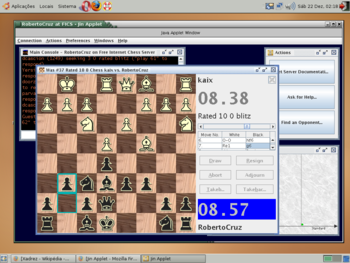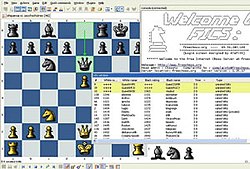Free Internet Chess Server: Difference between revisions
m robot Removing: es:Free Internet Chess Server |
|||
| Line 85: | Line 85: | ||
[[de:Free Internet Chess Server]] |
[[de:Free Internet Chess Server]] |
||
[[es:Free Internet Chess Server]] |
|||
[[fr:Free Internet Chess Server]] |
[[fr:Free Internet Chess Server]] |
||
[[pt:Free Internet Chess Server]] |
[[pt:Free Internet Chess Server]] |
||
Revision as of 21:16, 16 August 2008

The Free Internet Chess Server (FICS) is a volunteer-run Internet chess server. It was organized as a free alternative to the Internet Chess Club (ICC), after that site began charging for membership.
History
The first Internet chess server, unimaginatively named the Internet Chess Server (ICS), started in the 1980s. Volunteers coded and ran it free of charge. In 1995, administrators began charging players for membership and changed the name to ICC.
Unhappy with the commercialization of ICS, which they saw as exploiting their work, a handful of programmers, led by Chris Petroff (Sparky on FICS), formed FICS and gave users free, unrestricted access. The server debuted March 5, 1995, and remains operational today.
FICS is a non-profit site, administered entirely by volunteers. There are over 310,000 registered accounts, and in the past 12 months the server has been accessed by over 73,000 users.
The original software package, called "chessd", was released under the GNU General Public License, and has been extensively updated by many people and organizations. The last version dubbed "Chrysallis," engineered by volunteers at the Universidade Federal do Paraná in Brazil, includes backend support for the PostgreSQL and MySQL databases. Chessd is freely available on SourceForge.
Usage
Connecting

Playing chess on FICS requires connecting to the server either through a web based applet on the FICS website or using a client program, which could be as simple as a telnet client, but is usually an interface designed specifically for playing Internet chess. Users can log in as an anonymous guest, unless their site has a history of abusive behavior, or they can use the website to register for a free account. The server maintains game statistics and ratings for registered users. FICS uses the Glicko rating system.
Gameplay
Users may watch for seeks, game requests other users broadcast, or put out their own seeks and wait for someone else to respond. Seeks can be set to manual, if the person who makes the seek wants to screen potential opponents before deciding which one to play, which he might do if, for example, he doesn't wish to play an opponent with a significantly higher or lower rating.
Users can also challenge a specific player to a game using the match command. This is ideal for those who wish to play friendly games between friends.
Moves are made with the mouse on an image of the chess board. However, the user also has the option of typing in moves in algebraic notation, ideal for laptop users with only the built in touchpad as their mouse.
Time Controls
People tend to play much faster games on the Internet, typically three or five minutes per player (blitz) or one minute per player (lightning).
Fischer delay is often used: the time control is specified by two numbers, the minutes each player is allotted at the start of the game, and the seconds added to a player's clock after making a move (the increment). For example, in 2 12 time controls, each player receives 2 minutes at the beginning of the game, and 12 seconds is added to a player's clock after they make a move.
Timeseal is a utility which allows the server to account for the effects of lag. Each move entered by the user is timestamped locally, and the time spent for the move information to travel to the server is not deducted from the clock. This program can be helpful for people with poor connections, but it can also annoy opponents if extreme lag occurs, and large delays occur in real time but not on the clock. Unlike the Internet Chess Club and other pay servers, FICS does not track lag centrally, nor permit user preferences that exclude persistent laggers.
Interfaces
A chess interface is an application specifically designed to connect to and interact with Internet chess servers. FICS does not require a particular interface; many are available for download at the FICS website download area. Interfaces are developed independently of FICS. Accordingly, FICS does not have an official interface, nor does it endorse any particular interface. According to the current login statistics, the most popular interfaces for Windows are BabasChess, Jin [1], WinBoard, and Thief. On other operating systems eboard, XBoard, Jin, JavaBoard, and Decaf [2] are popular choices. JavaBoard and JinApplet are web interfaces; they run in a web browser and have fewer features than other clients.
Channels
There are a number of chat channels on FICS, similar to IRC, however there are a limited number of channels (numbered 0 through 255) and many are reserved for particular uses. For example, channel 1 is for general help; questions asked in channel 1 are usually answered by FICS admins or Service Representatives (SRs). Channel 4 is for helping guests, and channel 50 is for general chat. A user can listen and send tells to up to thirty channels simultaneously. Besides channels, another form of mass communication available to users is shouts, which can be seen by all users connected who haven't turned shouts off.
Variants
Some chess variants which are available on FICS:
- Chess - it is usually played with different time controls : Standard (15 minutes or more), Blitz (3 minutes or more but less than 15), and Lightning (less than three minutes).
- Suicide - capturing is compulsory, a player wins by losing all his pieces; the king has no special significance
- Loser's chess - like suicide, but with additional rules pertaining to the king and check
- Atomic - pieces "explode" when captured, removing all adjacent pieces except pawns
- Wild - several variants similar to regular chess, including Fischer random
- Bughouse - fast paced, four player game, in which two teams of two players face each other on two boards
- Crazyhouse - two player version of bughouse
Tournaments on FICS
A number of tournaments are regularly organised on FICS. Below is a summary of the most important of these.
Mamer tournaments
Mamer tournaments are organised by Mamer, an automated Tournament Director. Mamer is run by Mamer managers who have the designation (TM) beside their handles and who are there to supervise tournaments and assist users participating in the tournaments. The channel for mamer tournaments is channel 49, and tournaments are announced through tells to this channel as well as through cshouts. Tournaments organised by Mamer range in time controls from 1 0 to 90 30, and include all variants.
Other tournaments
Other regular tournaments on FICS mostly include tournaments featuring slow time controls (i.e. typically more than 45 minutes). Two of the most popular of these are FICS Teamleague, which uses 45 45 controls, and the Online Chess League (OCL), which uses 60 15 time controls. Both are team events with teams of 4 competing against each other, and each player typically plays one game per week. In addition, the STC Bunch, or the Slow Time Control Bunch, organises several tournaments with slow time controls.
Relay
FICS also relays top flight chess events. A bot, programmed by volunteers, learns the moves in ongoing games and relays them to special demo accounts on FICS, that are shown playing each other. These demo accounts bear the names of the grandmasters playing in the event. Thus, users and guests on FICS can watch the games in progress as they might watch any game between ordinary FICS users, and chat about the game with each other. The relay has covered every single World Chess Championship since its inception. Other major relays include the yearly relay of Wijk aan Zee, Morelia-Linares, Amber Melody, and any World Championship/World Cup events that take place.
Abuse
FICS's admins are vigilant against the various forms of abuse that can occur in internet chess. The most common form of abuse is swearing. FICS's rules of decorum forbid swearing in the general chat area, although swearing is tolerated in some unmoderated channels. Users caught swearing may be kicked off the server but are generally free to reconnect immediately. In the case of severe or repeated infractions, or violating other chat rules, the admins may revoke the user's right to use shouts or one or more channels.
Another common form of abuse is deliberately disconnecting from FICS while playing a difficult or lost position, with the idea of avoiding a loss or to gain time to analyze the position, possibly with the help of a computer. When one player disconnects, the game is generally saved for later resumption. Since disconnections may be accidental, users are normally given the benefit of the doubt, but users who demonstrate a habit of disconnecting in poor positions or refusing to resume their adjourned games are placed on a list of disconnect abusers. Known abusers automatically forfeit their game if they disconnect while playing. Frequent victims of opponents' disconnections will accumulate many adjourned games, and if they reach 16, they will not be able to start a new game. To resolve games which are not resumed, users may submit the games for adjudication. Users may also prevent the buildup of adjourned games by using the noescape feature; when in effect, a disconnection by either player forfeits the game.
A third form of abuse is using a chess engine to generate moves while playing. Chess engines are allowed to play on FICS only when they are registered as such, use of a chess engine by a user not so registered constitutes cheating. FICS does not use any form of spyware to detect cheating, instead, the admins examine randomly selected games and games submitted by suspicious opponents to detect behavior, including but not limited to moves, consistent with cheating. Users caught cheating are barred from playing rated games, and may have their ratings erased. The opposite of computer cheating is sandbagging, in which users deliberately play weaker than their normal strength, or throw games. Users caught sandbagging are also barred from rated play, since this is also abuse of the rating system.
Admins catch some abusers by direct observation, but they rely on regular users to assist them in identifying abusers. For this purpose, there are three special admin accounts to which users may send messages to report abusers. Users report suspected computer cheating to Computerabuse and disconnections to Adjudicate, since a disconnection usually entails a stored game which must be resolved. Other forms of abuse are reported to Abuse. Admins investigate each report of abuse and decide what sanctions, if any, will be applied to the offending user. Sanctions may range from a warning to banishment from the server.
In part because of the relative anonymity of the internet, users are often offensive to each other even if the offense does not rise to the limits of FICS's rules of decorum. To preserve user's enjoyment of the service, and to avoid heated arguments in the chat channels, admins encourage users to place offensive users on their personal noplay or censor lists. If user A noplays user B, user B will not be able to challenge or otherwise start a chess game with user A. If user A censors user B, user B will neither be able to play nor talk to user A. All forms of communication from user B to user A are blocked.
